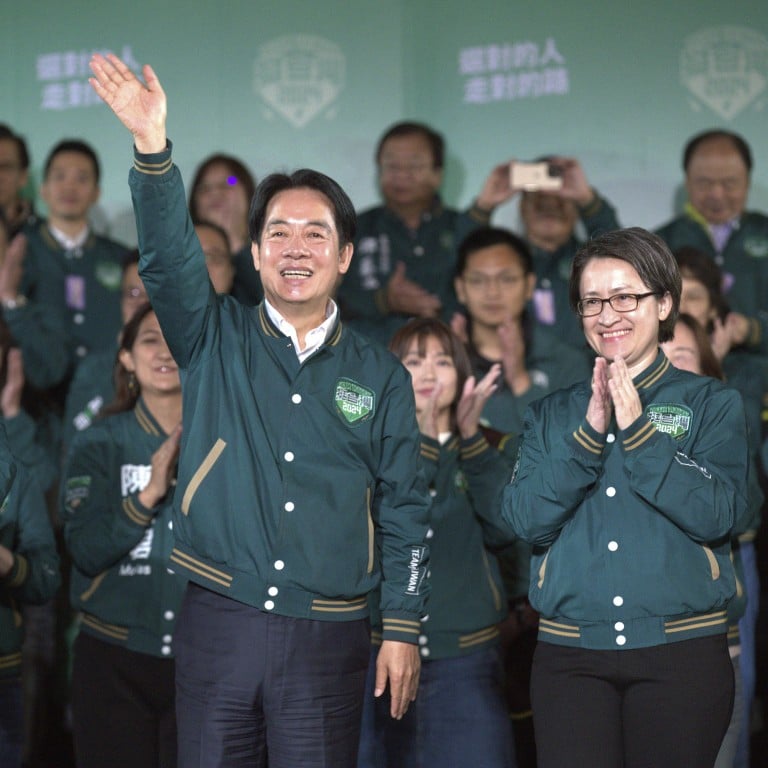
Taiwan Strait may face ‘political tsunami’ in 2025 but young hearts can save the day: mainland China journal
- Election of William Lai has sparked cross-strait ‘uncertainty’ that may worsen if Trump returns to power, article in Taiwan affairs journal says
- But Beijing has room for leverage, authors say, as Lai’s DPP has lost legislative majority and young Taiwanese are fans of mainland social media
Political risks across the Taiwan Strait were likely to spike next year but younger Taiwanese could still be won over on social media, observers in mainland China said in a recent article.
Lai, the sitting vice-president from the ruling Democratic Progressive Party, was elected on January 13 with nearly 40 per cent of the vote, in an election framed by Beijing as a choice between war and peace.
Lai might adopt “low profile” and “moderate” cross-strait policies after taking office next month, and was unlikely to declare “de jure Taiwan independence” any time soon, the article said.
But, in the long term, Lai might bring “high” risks such as decoupling with the mainland economy, and even “very high” risks of “causing major accidental incidents” in the strait, it added.
Ma urges Taiwan’s next president to respond ‘pragmatically’ to Xi’s ‘olive branch’
Co-authored by Wang Zhenwei, director of the politics department under Xiamen University’s Graduate Institute for Taiwan Studies, the article also warned of “extremely high” risks of a re-elected Lai “colluding” with the United States and Japan.
The institute is a major mainland think tank on Taiwan affairs. Tan Xin, a graduate of the institute, was the other author.
The write-up was posted on the cross-strait journal’s social media account earlier on Friday but is no longer available on the site.
However, the article suggested that Beijing was still watching his behaviour for further evaluation, though the situation might become further complicated after the US presidential election in November.
The article also said that Beijing would “carry out crisis management” over Lai ahead of his May 20 inauguration, but did not elaborate.
From May 20 to November 5, US election day, the situation in the Taiwan Strait would be “peaceful winds and waves”, the article said. “There may be a period of waiting, pause, and watching between China and the United States and between the two sides of the Taiwan Strait.”
But the strait might be hit by a political “tsunami” in 2025, the article warned, because Lai might become more “radical” ahead of local elections in Taiwan the following year, and through possible collaboration with Donald Trump, if the Republican were to return to the White House.
The article came just weeks after a phone call between Chinese President Xi Jinping and his US counterpart Joe Biden, when Xi said that bilateral relations this year should “focus on stability” and “no troublemaking”. He also said that Beijing would not allow foreign countries to support Taiwan independence activities.
Beijing sees Taiwan as part of its territory awaiting reunification, by force if necessary. The United States, like most countries, does not recognise the self-ruled island as independent but is opposed to any attempt to take it by force and remains committed to supplying Taipei with weapons.
In December 2016, then president-elect Trump broke with tradition to hold a phone conversation with Taiwanese President Tsai Ing-wen, who had taken office earlier that year. The Trump administration also scaled up arms sales to Taiwan, angering Beijing.
‘Two sessions’ 2024: Premier Li Qiang decries ‘external interference’ in Taiwan
Lai might “become a peace destroyer in the Taiwan Strait”, and a ‘combination’ of Trump and Lai would trigger “a political tsunami in the Taiwan Strait”, the article said.
However, Beijing may still have room for leverage, the article said, as Lai may have won the presidential vote but the DPP lost its legislative majority. The Beijing-friendly opposition Kuomintang emerged as the single largest party in the legislature in January’s election.
Meanwhile, Beijing sees that the majority public opinion in Taiwan leans towards seeking peace, cross-strait exchanges, cooperation and development, the article said, adding that the generation aged 10-24 years was the main group whose hearts must be won.
Social media platforms such as TikTok and its mainland version Douyin, as well as Xiaohongshu or “little red book”, China’s version of Instagram, are very popular among younger Taiwanese, it said.
“As long as the mainland works properly, it can win the support of Taiwan’s Generation Z and create a rational and pragmatic young generation.”

